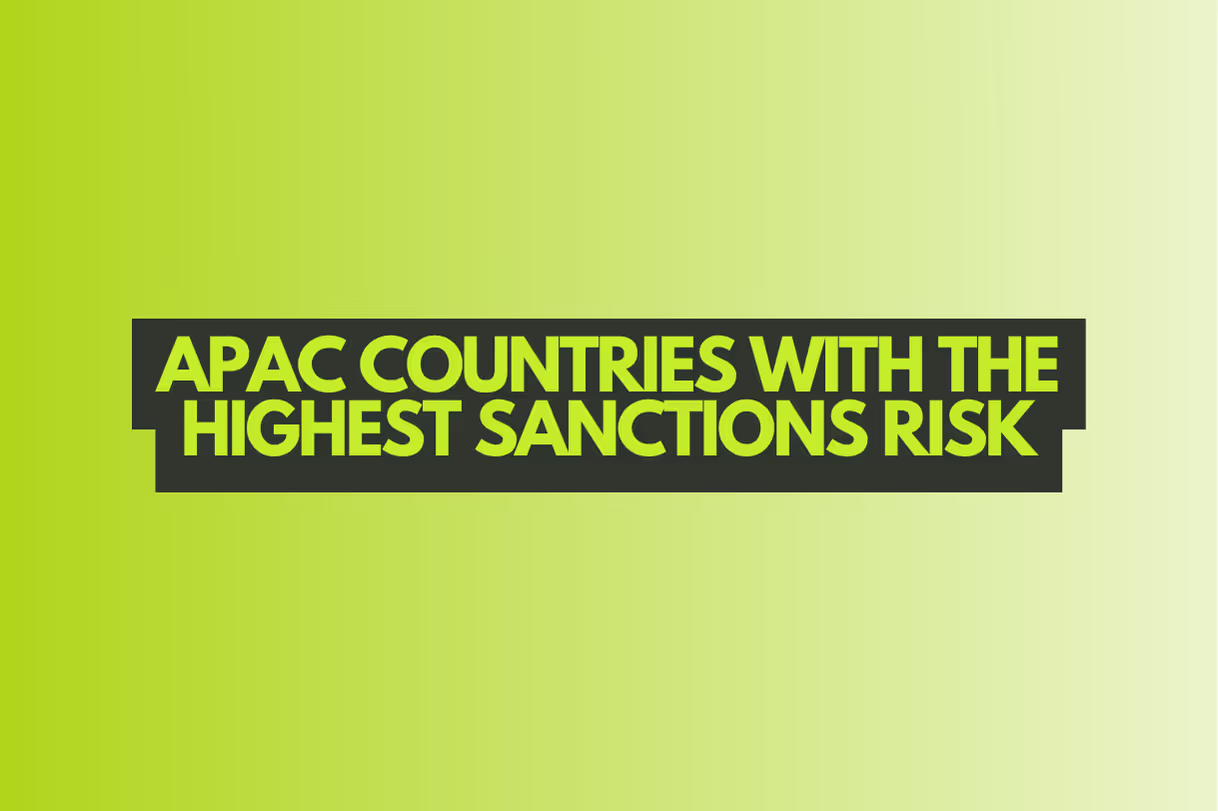
APAC Countries with the Highest Sanctions Risk
The Asia-Pacific region presents a complex and often inconsistent sanctions environment, with 17 countries maintaining autonomous sanctions programs. While Australia and New Zealand lead the region with structured, accessible, and high-integrity lists, most other jurisdictions fall short due to vague designations, poor data formatting, and a lack of public guidance. China and Singapore stand out as high-risk due to opaque practices and limited usability, while Malaysia and Indonesia show technical promise but lack accessibility and clarity. Smaller nations often operate under UN mandates, lacking responsive national frameworks. For compliance professionals, navigating APAC sanctions requires robust screening tools, enhanced due diligence, and region-specific expertise to mitigate risk and ensure regulatory alignment.
The Asia-Pacific region is home to a complex and evolving sanctions landscape, with some of the most inconsistent and fragmented autonomous sanctions regimes globally. While 17 APAC countries operate autonomous sanctions programs, the quality and usability of these lists vary dramatically. Australia and New Zealand stand out for their structured, transparent, and accessible lists, but the majority of APAC nations present significant compliance challenges due to poor data integrity, limited guidance, and opaque designation processes.
High-Risk Sanctions Jurisdictions in APAC
China currently poses the greatest sanctions compliance risk within the APAC region. Its Ministry of Foreign Affairs (MFA) does not publish a centralized sanctions list and instead announces designations through press releases, many of which are later removed. There is no official archive, no consistent formatting, and no clarity around delisting or renewal criteria. Designations are often politically motivated and include vague justifications such as “harming China's sovereignty" or "spreading disinformation."
Singapore, often praised for its strong financial oversight, surprisingly offers one of the more difficult lists to work with. Its Terrorism Suppression of Financing Act sanctions regime is technically accessible, but suffers from low data granularity and little public guidance. While the Monetary Authority of Singapore offers email alerts and allows public access to the list without login, it does not explain why individuals or entities are listed, increasing ambiguity and compliance uncertainty.
Mid-Risk Jurisdictions with Some Positive Features
Malaysia and Indonesia fall into the mid-risk category due to the relatively high technical quality of their sanctions lists, though each has serious limitations. Malaysia’s Ministry of Home Affairs (MHA) sanctions list uses a standardized schema with clearly labeled data fields and allows open access. However, it lacks a search tool and public-facing explanations for designations, limiting its utility.
Indonesia’s List of Suspected Terrorists and Terrorist Organizations (DTTOT) scores well in data formatting, using distinct identifiers and standardized input. However, the list is difficult to locate via search engines, and cross-referencing is poor across government sites. These issues raise the barrier to effective use, especially for global compliance teams seeking consistent information access.
{{snippets-guide}}
The Leaders: Australia and New Zealand
Australia and New Zealand offer the most robust autonomous sanctions lists in APAC. The Australian Department of Foreign Affairs and Trade (DFAT) sanctions list features high data integrity, standardized schema, and open access. Each entry is assigned a unique identifier, reducing false positives, and the list includes detailed metadata such as citizenship and place of birth. However, its usability is limited by the lack of a downloadable file format and universal listing explanations.
New Zealand’s Terrorist Sanctions list also demonstrates best practices in data clarity and guidance. Entries provide full identification details and explanations for each designation. However, the list is not easily discoverable online and lacks features like a search tool or update alerts, which dampens its accessibility. Despite these shortcomings, both countries set the regional standard for sanctions transparency and usability.
The Challenge of Small, Opaque Lists
Many APAC countries maintain small sanctions lists that offer limited utility and pose hidden risks. Vietnam, Thailand, Nepal, and Bangladesh all operate sanctions lists with fewer than 100 designations. These lists typically lack standardized schemas, do not include metadata or filtering tools, and provide little to no public guidance. Consequently, they generate high false positive rates and increase the burden on compliance teams.
Several of these countries issue designations without consistent review timelines or clear criteria. As a result, compliance professionals often must rely on third-party translations or historical press statements to understand the scope of risk, further complicating cross-border screening processes.
Countries Without Autonomous Lists
Roughly 60% of APAC countries do not maintain their own sanctions programs. Instead, they rely primarily on implementing UN sanctions regimes. Nations such as Cambodia, Sri Lanka, Laos, and Mongolia fall into this category. While this lowers the volume of screening requirements, it also limits responsiveness to evolving geopolitical crises such as Russia’s invasion of Ukraine or the situation in Myanmar.
Countries without autonomous lists face growing pressure to modernize their compliance infrastructure. As financial crimes, cyber threats, and global terrorism evolve, dependency on UN-only measures leaves gaps in enforcement and detection. Increasingly, regulators and banks are urging these jurisdictions to adopt national-level lists to strengthen AML and sanctions frameworks.
{{snippets-case}}
Key Takeaways for Compliance Professionals
APAC is a region where the volume of sanctions lists does not equate to quality. While 17 countries maintain their own lists, only a handful meet global compliance expectations. The lack of structured data, absence of public guidance, and poor update mechanisms in many APAC lists create operational risk for institutions relying on them for screening.
Compliance professionals working with APAC jurisdictions should invest in enhanced due diligence, especially when dealing with countries that lack robust, well-maintained lists. Screening tools must be capable of handling low-quality datasets, and organizations should consider supplemental risk indicators, including reputational and geopolitical factors, to manage exposure effectively.
sanctions.io is a highly reliable and cost-effective solution for real-time screening. AI-powered and with an enterprise-grade API with 99.99% uptime are reasons why customers globally trust us with their compliance efforts and sanctions screening needs.
To learn more about how our sanctions, PEP, and criminal watchlist screening service can support your organization's compliance program: Book a free Discovery Call.
We also encourage you to take advantage of our free 7-day trial to get started with your sanctions and AML screening (no credit card is required).



